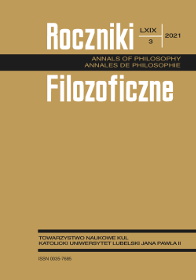From Satan’s Wager to Eve’s Gambit to Our Leap: An Anselmian Reply to the Problem of Divine Hiddenness
Abstract
While St. Anselm does not supply us with an explicit discussion of the problem of divine hiddenness (PDH) as it is typically conceived today—namely, as an argument for atheism—he is keenly aware of the existential difficulty posed by our seeming lack of access to God. Moreover, he provides the ingredients for an interesting and heretofore neglected approach to the PDH, one rooted in multiple Christian narratives about lapses from knowledge-infused states of grace, both angelic and human. The goal of this paper is to draw out that Anselmian approach explicitly, and to provide at least a rudimentary assessment of it.
References
Athanasius. On the Incarnation of the Word. Translated by Archibald Robertson. Buffalo, NY: Christian Literature Publishing, 1892.
Augustine. On Free Choice of the Will. Translated by Thomas Williams. Indianapolis: Hackett, 1993.
Azadegan, Ebrahim. “Divine Love and the Argument from Divine Hiddenness.” European Journal for Philosophy of Religion 6, no. 2 (2014): 101–16.
Chrysostom, John. Homilies on First Corinthians. Translated by Talbot W. Chambers. Buffalo, NY: Christian Literature Publishing, 1889.
Coakley, Sarah. “Divine Hiddenness or Dark Intimacy? How John of the Cross Dissolves a Contemporary Philosophical Dilemma.” In Hidden Divinity and Religious Belief: New Perspectives, edited by Adam Green and Eleonore Stump, 229–45. Cambridge: Cambridge University Press, 2015.
Confessor, Maximus. On Difficulties in Sacred Scripture: The Responses to Thalassios. Translated by Maximos Constas. Washington, DC: Catholic University of America Press, 2018.
Damascene, John. On the Orthodox Faith. In Writings. Translated by Frederic Chase. Washington, DC: Catholic University of America Press, 1958.
Di Ceglie, Roberto. “Christian Belief, Love for God, and Divine Hiddenness.” Philosophia Christi 18, no. 1 (2016): 179–93.
Drange, Theodore. “The Argument from Non-Belief.” Religious Studies 29, no. 4 (1993): 417–32.
Drange, Theodore. Nonbelief and Evil: An Argument for the Nonexistence of God. Amherst, NY: Prometheus, 1998.
Dumsday, Travis. “A Thomistic Response to the Problem of Divine Hiddenness.” American Catholic Philosophical Quarterly 87, no. 3 (2013): 365–77.
Garcia, Laura. “St. John of the Cross and the Necessity of Divine Hiddenness.” In Divine Hiddenness: New Essays, edited by Daniel Howard-Snyder and Paul Moser, 83–97. Cambridge: Cambridge University Press, 2002.
Henry, Douglas. “Does Reasonable Nonbelief Exist?” Faith and Philosophy 18, no. 1 (2001): 75–92.
Henry, Douglas. “Reasonable Doubts about Reasonable Nonbelief.” Faith and Philosophy 25, no. 3 (2008): 276–89.
Jackson, Elisabeth. “Wagering against Divine Hiddenness.” European Journal for Philosophy of Religion 8, no. 4 (2016): 85–108.
Keller, James. “The Hiddenness of God and the Problem of Evil.” International Journal for Philosophy of Religion 37, no. 1 (1995): 13–24.
King, Rolfe. Obstacles to Divine Revelation: God and the Reorientation of Human Reason. London: Continuum, 2008.
Lossky, Vladimir. The Mystical Theology of the Eastern Church. Crestwood, New York: St. Vladimir’s Seminary Press, 1957.
Maitzen, Stephen. “Divine Hiddenness and the Demographics of Theism.” Religious Studies 42, no. 2 (2006): 177–91.
Marcar, G. P. “Aquinas’ Quinque Viae: Fools, Evil, and the Hiddenness of God.” Heythrop Journal 56, no. 1 (2015): 67–75.
Morris, Thomas V. Making Sense of It All: Pascal and the Meaning of Life. Grand Rapids, MI: Eerdmans, 1992.
Murray, Michael. “Deus Absconditus.” In Divine Hiddenness: New Essays, ed. Daniel Howard-Snyder and Paul Moser, 62–82. Cambridge: Cambridge University Press, 2002.
Nazianzus, Gregory. Orations. Translated by Charles G. Browne and James E. Swallow. Buffalo, NY: Christian Literature Publishing, 1894.
Nemoianu, V. Martin. “Pascal on Divine Hiddenness.” International Philosophical Quarterly 55, no. 3 (2015): 325–43.
Origen, On First Principles. Translated by Frederick Crombie. Buffalo, NY: Christian Literature Publishing, 1885.
Paytas, Tyler. “Of Providence and Puppet Shows: Divine Hiddenness as Kantian Theodicy.” Faith and Philosophy 36, no. 1 (2019): 56–80.
Pseudo-Dionysius. The Celestial Hierarchy. In Pseudo-Dionysius: The Complete Works, translated by Colm Luibheid, 260C–261D. Mahwah, NJ: Paulist Press, 1987.
Rogers, Katherin. Anselm on Freedom. Oxford: Oxford University Press, 2008.
Rogers, Katherin. Freedom and Self-Creation: Anselmian Libertarianism. Oxford: Oxford University Press, 2015.
Rogers, Katherin. Perfect Being Theology. Edinburgh: Edinburgh University Press, 2000.
Rogers, Katherin. The Neoplatonic Metaphysics and Epistemology of Anselm of Canterbury. Lewiston, NY: Edwin Mellen Press, 1997.
Schellenberg, J. L. Divine Hiddenness and Human Reason. Ithaca, NY: Cornell University Press, 1993.
Schellenberg, J. L. The Hiddenness Argument: Philosophy’s New Challenge to Belief in God. Oxford: Oxford University Press, 2015.
Schellenberg, J. L. The Wisdom to Doubt: A Justification of Religious Skepticism. Ithaca, NY: Cornell University Press, 2007.
Swinburne, Richard. Providence and the Problem of Evil. Oxford: Oxford University Press, 1998.
Swinburne, Richard. The Existence of God, 2nd ed. Oxford: Oxford University Press, 2004.
Williams, Thomas, trans. Anselm: Basic Writings. Indianapolis, IN: Hackett, 2007.
Copyright (c) 2021 Roczniki Filozoficzne

This work is licensed under a Creative Commons Attribution-NonCommercial-NoDerivatives 4.0 International License.





